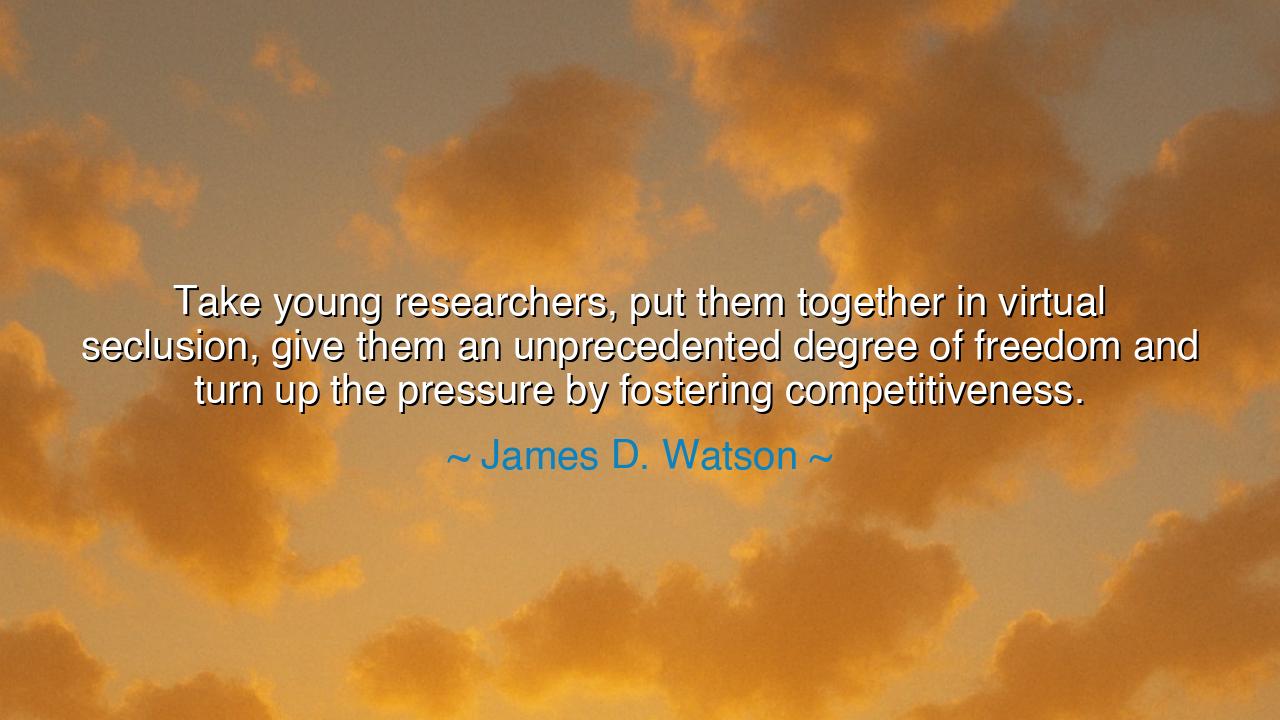
Take young researchers, put them together in virtual seclusion
Take young researchers, put them together in virtual seclusion, give them an unprecedented degree of freedom and turn up the pressure by fostering competitiveness.






"Take young researchers, put them together in virtual seclusion, give them an unprecedented degree of freedom and turn up the pressure by fostering competitiveness." These words, spoken by the esteemed James D. Watson, encapsulate the essence of scientific discovery and the driving forces behind human innovation. In this statement, Watson outlines the conditions that fuel the spark of genius and creative breakthroughs: the isolation and freedom to explore, paired with the fierce competitiveness that drives individuals to push the boundaries of what is possible. But within these conditions lies both the potential for greatness and the risk of burnout, creating a fine balance between freedom and pressure that ultimately shapes the future of science.
The ancients understood that knowledge and wisdom were not easily attained, and they often saw the path to greatness as one marked by both dedication and sacrifice. The Greek philosophers believed that the search for truth required immense discipline, and that the pursuit of wisdom was often a solitary endeavor. In their schools of thought, young minds were encouraged to isolate themselves from distractions, immersing themselves in the study of the world. But even the great thinkers of ancient times understood that competition could drive the pursuit of knowledge. Socrates, though known for his humility, also engaged in a fierce intellectual competition with his peers, challenging them to think more deeply, to see beyond the surface, and to question the very foundations of their beliefs. This competitive spirit in the search for truth mirrors Watson's call for the conditions that foster scientific breakthroughs.
What Watson describes is not merely a laboratory setup, but the very essence of scientific progress itself. The virtual seclusion of researchers reflects the solitude that is often required for deep thought and discovery. Great minds such as Einstein, who pondered the mysteries of the universe in quiet reflection, often worked alone, in seclusion, away from the distractions of the outside world. Yet, their freedom to explore, unburdened by limitations, was essential to their innovations. Einstein's theory of relativity was born not in the crowds, but in the stillness of his own contemplations. However, it was not enough to be isolated and free; there had to be the drive—the competitive spark that pushed Einstein and others to expand the boundaries of science.
The tension Watson describes—the fine line between freedom and pressure—is evident in the famous story of the discovery of DNA by Watson, Crick, and Franklin. In their race to uncover the structure of DNA, they were driven by an intense competitive spirit, each striving to be the first to unlock the secrets of life’s blueprint. The isolation, the freedom to explore ideas without immediate interference, and the constant pressure to outperform their peers created an environment that led to one of the greatest discoveries in modern science. Watson’s words, though describing a laboratory setup, speak to a greater truth: scientific discovery thrives when the right conditions—a blend of freedom and pressure—are in place. The tension between collaboration and competition can spark the kind of creativity that leads to breakthroughs.
Yet, while this environment breeds innovation, it also holds its dangers. The pressure Watson speaks of can, at times, be overwhelming, leading to moments of exhaustion and frustration. History is replete with examples of individuals who were consumed by their work, their competitive drive, and the seclusion necessary for discovery, only to find that the toll it took on their health or well-being was immense. Consider the tragic story of Nikola Tesla, whose singular focus on his experiments led him to extreme isolation and eventual financial ruin. Tesla's brilliance was undeniable, yet his pressure-driven pursuit of invention left him a shadow of the genius he once was, illustrating the fine balance between freedom and burnout that must be navigated in the pursuit of greatness.
The lesson from Watson’s words is one of balance and discipline—the pursuit of knowledge requires both freedom and structure, competition and collaboration. It reminds us that while the environment we create can spark incredible discoveries, it is equally important to ensure that the pressure we put on ourselves—and on others—does not become an obstacle to long-term success. The pursuit of greatness is not always linear, and the path to discovery is often fraught with challenges. To follow in the footsteps of the great minds of history, we must embrace both the freedom to explore and the discipline to persevere through the challenges that arise.
In your own life, reflect on how you approach your work, your studies, or your passions. Do you allow yourself the freedom to explore new ideas, to push boundaries without fear of failure? Do you maintain a healthy balance between competition and collaboration, knowing that both are essential for growth? Remember that progress is rarely achieved through ease or comfort, but through the tension that exists between freedom and pressure, between the joy of discovery and the discipline needed to bring it to fruition. The great minds of history did not achieve greatness by following the easy path; they did so by embracing the challenge, the struggle, and the competitive spirit that propelled them forward.
As you continue on your journey, be mindful of the conditions you create for yourself and others. Harness the power of competition to fuel your drive, but never let it overshadow the joy of learning. Balance freedom with the discipline needed to stay focused on your goals. In doing so, you will not only unlock the potential within yourself but contribute to the collective progress of humanity. Like the scientists of the past, your breakthroughs may come when you least expect them, but only if you remain open to exploration, creativity, and the balance between freedom and pressure.






AAdministratorAdministrator
Welcome, honored guests. Please leave a comment, we will respond soon